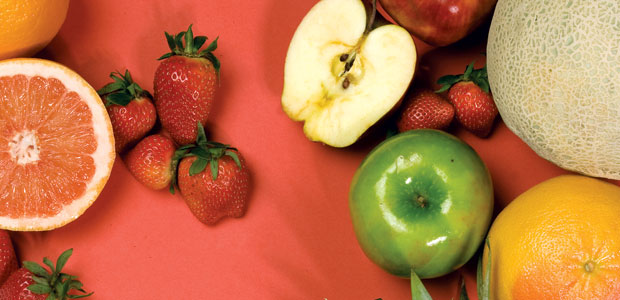Advertisement
Wet Your Whistle
Top 10 hydrating fruits & veggies

But just how much water does one need to maintain optimal health?
Although the amount needed varies from person to person, the Institute of Medicine recommends that men consume roughly 16 cups (3.7 litres) and women drink 11 cups (2.7 litres) of water daily.
While 11 cups of water or more may sound like an overwhelming amount of fluid, the good news is that you don’t have to drink it. You can eat your way to hydration too. On average, 20 percent of a person’s daily water intake comes from food, not beverages.
The following fruits and vegetables contain more than 80 percent water by weight. In addition to helping the body stay hydrated, these water-rich foods also contain essential nutrients that ward off diseases and promote overall good health.
Advertisement
Water-filled fruits
| Fruits | % of water | Benefits |
| Watermelon |
92 |
One wedge of this summer favourite contains just over a cup of water. Watermelon is one of the few dietary sources of lycopene, an antioxidant that provides support against free radicals. |
| Strawberry |
92 |
Delicious and nutritious, these juicy bright red berries are packed full of phytonutrients, vitamin C, and dietary fibre. |
| Grapefruit |
91 |
Grapefruit contains limonoids, a phytonutrient that may inhibit tumour growth and help prevent prostate cancer. |
|
Cantaloupe |
90 |
Rich in beta carotene, 1 cup of cantaloupe contains 103% of the recommended daily value of vitamin A which helps regulate the immune system. |
|
Pineapple |
87 |
One cup of fresh pineapple contains 128% of the daily value of magnesium. This important trace mineral is essential for bone maintenance. |
|
Orange |
87 |
One orange contains 116% of the daily value of vitamin C, a powerful antioxidant that protects us from free radical damage and boosts our immune system. |
|
Apricot |
86 |
Apricots are a good source of beta carotene as well as free radical-fighting, heart-friendly lycopene. |
|
Blueberry |
85 |
A nutritional superstar, blueberries rank high in antioxidants that help fight aging, cancer, and heart disease. |
|
Plum |
85 |
Plums are a good source of lutein and zeaxanthin, two antioxidants that may help prevent macular degeneration. |
| Apple |
84 |
As a source of both soluble and insoluble fibre, an apple a day may also help lower cholesterol levels. |
Advertisement
Advertisement
Moisture-drenched veggies
| Vegetables | % of water | Benefits |
| Cucumber |
96 |
While the flesh of a cucumber is almost all water, the skin is a good source of fibre and contains a number of trace minerals including silica, essential for healthy skin, hair, and nails. |
| Celery |
95 |
An excellent source of water, celery is also a great source of vitamin C, folate, and dietary fibre. |
| Radish |
95 |
Low in calories, this spicy root vegetable contains vitamin C, beta carotene, and the antioxidant, caffeic acid, which may have cancer-preventing properties. |
| Zucchini |
95 |
Low in calories, zucchini has diuretic properties and is a good source of vitamin C, magnesium, and potassium. |
| Tomato (red) |
94 |
Tomatoes are famous for their high lycopene content. Lycopene fights free radicals in the bloodstream and may help reduce incidences of cancer, cardiovascular disease, and macular degeneration. |
| Cabbage (green) |
92 |
Cabbage is an excellent source of vitamin C, an antioxidant that protects cells from cancer. |
| Spinach |
92 |
The vegetable behind Popeye’s strength, 1 cup of uncooked spinach has nearly 2 mg of iron, a mineral essential for muscle health. |
|
Bell pepper |
92 |
Whether green, red, orange, or yellow, brightly coloured bell peppers are excellent sources of both vitamins A and C, two very powerful antioxidants. |
|
Eggplant |
92 |
This purple egg-shaped vegetable contains the powerful flavonoid, nasunin. Able to protect cell membranes from damage, nasunin also helps remove excess iron from the blood. |
| Broccoli |
91 |
Broccoli contains sulforaphane, a phytochemical that is thought to be helpful in preventing cancer (particularly prostate cancer). |
Advertisement
Advertisement
Super-hydrating foods
| Food | % of water |
| Red kidney beans |
77 |
| Chicken breast (roasted) |
65 |
| Salmon (baked) |
62 |
| Couscous |
50 |
| Hamburger (with lettuce, tomato, and onion) |
50 |
| Cheddar cheese |
40 |
| Whole wheat bread |
33 |
Advertisement
Advertisement
When do I need more water?
When exercising
Drink an extra 1.5 to 2.5 cups (400 to 600 mL) of water when exercising for less than an hour. Increase water intake when exercising for longer periods of time, exercising heavily,
or sweating profusely.
When it’s hot or humid outside
Hot or humid weather and high altitudes over 8,200 feet (2,500 metres) can cause dehydration. Drink extra water to compensate for fluid loss.
When ill
Vomiting, diarrhea, fever, bladder infections, and kidney stones cause fluid loss. In extreme cases oral rehydration solutions may be taken to restore fluids.
When pregnant and nursing
Pregnant women should drink 11 cups (2.7 litres) of water a day and nursing mothers should drink 13 cups (3.1 litres) a day to remain hydrated.





